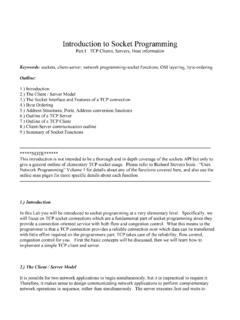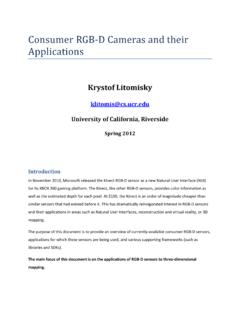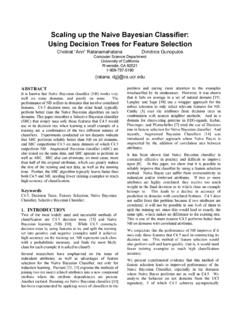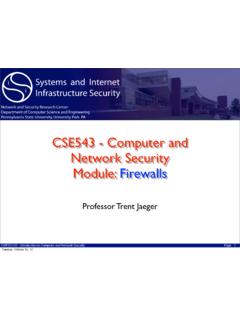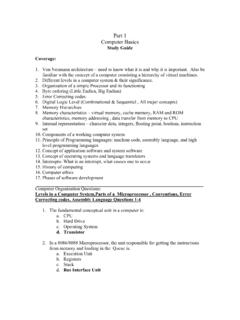Transcription of C++ Interview Questions Compiled by Dr. Fatih Kocan, Wael ...
1 C++ Interview Questions Compiled by Dr. Fatih Kocan, Wael Kdouh, and Kathryn Patterson for the Data Structures in C++ course(CSE 3358) Spring 2008 ! "# $ % & '(!) * +, - $ .+/ '( 0 ' 123 +, *&45 . 6 7 1) % 8 9 :;< =. > ?(' 8 @ BA%A8 ? 1 CED> % F =GC5- % ?(945 =H $ +I J('K< % F E :7 CE $ % > :(" Q: Is it possible to have Virtual Constructor? If yes, how? If not, Why not possible? A: There is nothing like Virtual Constructor. The Constructor can t be virtual as the constructor is a code which is responsible for creating an instance of a class and it can t be delegated to any other object by virtual keyword means.))))
2 Q: What is constructor or ctor? A: Constructor creates an object and initializes it. It also creates vtable for virtual functions. It is different from other methods in a class. Q: What about Virtual Destructor? A: Yes there is a Virtual Destructor. A destructor can be virtual as it is possible as at runtime depending on the type of object caller is calling to, proper destructor will be called. Q: What is the difference between a copy constructor and an overloaded assignment operator? A: A copy constructor constructs a new object by using the content of the argument object. An overloaded assignment operator assigns the contents of an existing object to another existing object of the same class.
3 Q: Can a constructor throws an exception? How to handle the error when the constructor fails? A:The constructor never throws an error. Q: What is default constructor? A: Constructor with no arguments or all the arguments has default values. Q: What is copy constructor? A: Constructor which initializes the it's object member variables ( by shallow copying) with another object of the same class. If you don't implement one in your class then compiler implements one for you. for example: (a) Boo Obj1(10); // calling Boo constructor (b) Boo Obj2(Obj1); // calling boo copy constructor (c) Boo Obj2 = Obj1;// calling boo copy constructor Q: When are copy constructors called?
4 A: Copy constructors are called in following cases: (a) when a function returns an object of that class by value (b) when the object of that class is passed by value as an argument to a function (c) when you construct an object based on another object of the same class (d) When compiler generates a temporary object Q: Can a copy constructor accept an object of the same class as parameter, instead of reference of the object? A:No. It is specified in the definition of the copy constructor itself. It should generate an error if a programmer specifies a copy constructor with a first argument that is an object and not a reference.
5 Q: What is conversion constructor? A: constructor with a single argument makes that constructor as conversion ctor and it can be used for type conversion. for example: class Boo { public: Boo( int i ); }; Boo BooObject = 10 ; // assigning int 10 Boo object Q:What is conversion operator?? A:class can have a public method for specific data type conversions. for example: class Boo { double value; public: Boo(int i ) operator double() { return value; } }; Boo BooObject; double i = BooObject; // assigning object to variable i of type double. now conversion operator gets called to assign the value. Q: How can I handle a constructor that fails?
6 A: throw an exception. Constructors don't have a return type, so it's not possible to use return codes. The best way to signal constructor failure is therefore to throw an exception. Q: How can I handle a destructor that fails? A: Write a message to a log-_le. But do not throw an exception. The C++ rule is that you must never throw an exception from a destructor that is being called during the "stack unwinding" process of another exception. For example, if someone says throw Foo(), the stack will be unwound so all the stack frames between the throw Foo() and the } catch (Foo e) { will get popped. This is called stack unwinding.
7 During stack unwinding, all the local objects in all those stack frames are destructed. If one of those destructors throws an exception (say it throws a Bar object), the C++ runtime system is in a no-win situation: should it ignore the Bar and end up in the } catch (Foo e) { where it was originally headed? Should it ignore the Foo and look for a } catch (Bare) { handler? There is no good answer:either choice loses information. So the C++ language guarantees that it will call terminate() at this point, and terminate() kills the process. Bang you're dead. Q: What is Virtual Destructor? A: Using virtual destructors, you can destroy objects without knowing their type - the correct destructor for the object is invoked using the virtual function mechanism.
8 Note that destructors can also be declared as pure virtual functions for abstract classes. if someone will derive from your class, and if someone will say "new Derived", where "Derived" is derived from your class, and if someone will say delete p, where the actual object's type is "Derived" but the pointer p's type is your class. Q: Can a copy constructor accept an object of the same class as parameter, instead of reference of the object? A: No. It is specified in the definition of the copy constructor itself. It should generate an error if a programmer specifies a copy constructor with a first argument that is an object and not a reference.
9 Q: What's the order that local objects are destructed? A: In reverse order of construction: First constructed, last destructed. In the following example, b's destructor will be executed first, then a's destructor: void userCode() { Fred a; Fred b; .. } Q: What's the order that objects in an array are destructed? A: In reverse order of construction: First constructed, last destructed. In the following example, the order for destructors will be a[9], a[8], .., a[1], a[0]: void userCode() { Fred a[10]; .. } Q: Can I overload the destructor for my class? A: No. You can have only one destructor for a class Fred.
10 It's always called Fred::~Fred(). It never takes any parameters, and it never returns anything. You can't pass parameters to the destructor anyway, since you never explicitly call a destructor (well, almost never). Q: Should I explicitly call a destructor on a local variable? A: No! The destructor will get called again at the close } of the block in which the local was created. This is a guarantee of the language; it happens automagically; there's no way to stop it from happening. But you can get really bad results from calling a destructor on the same object a second time! Bang! You're dead! Q: What if I want a local to "die" before the close } of the scope in which it was created?
